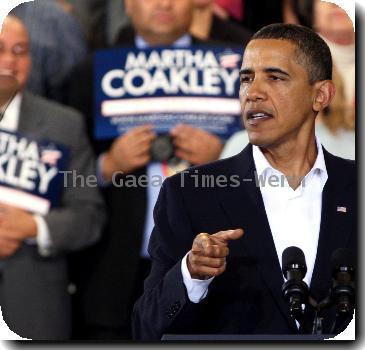Officials: With family’s help, FBI cracked Christmas bomb suspect, gained fresh terror intel
By Pete Yost, APTuesday, February 2, 2010
Officials: FBI cracked bomb suspect through family
WASHINGTON — The Nigerian man accused of trying to use a bomb hidden in his underwear to bring down a Detroit-bound airliner on Christmas Day has been cooperating with investigators since last week, discussing his contacts in Yemen and providing intelligence in multiple terrorism investigations, officials said Tuesday.
Umar Farouk Abdulmutallab’s cooperation could prove to be a national security victory and a political vindication for President Barack Obama, who has been under fire from lawmakers who contend the administration botched the case by giving Abdulmutallab the right to remain silent, rather than interrogating him as a military prisoner.
In the days following the failed bombing, a pair of FBI agents flew to Nigeria and persuaded Abdulmutallab’s family to help them. When the agents returned to the U.S., Abdulmutallab’s family came, too, according to a senior administration official briefed on the case. The family persuaded Abdulmutallab to work with the FBI, believing he would be treated fairly in U.S. courts, the official said, speaking on condition of anonymity because of the sensitivity of the case.
FBI officials continue to question Abdulmutallab, working in collaboration with CIA and other intelligence authorities, the official said. Obama has received regular updates on the interrogation, according to the official. A law enforcement official, also speaking on condition of anonymity because he was not authorized to discuss the case, said Abdulmutallab has provided information about his contacts in Yemen, where an al-Qaida branch has claimed responsibility for the failed attack.
Before the attack, the U.S. regarded the Yemen-based al-Qaida in the Arabian Peninsula largely as a threat to Yemen’s stability, not within U.S. borders. Depending on how much he knows, Abdulmutallab’s cooperation could help authorities better understand the organization.
While the interrogation continued, White House and intelligence officials quietly seethed as political rivals accused them of putting lives at risk. That criticism peaked last weekend when Sen. Susan Collins of Maine, in the weekly Republican address, accused the administration of having “a blind spot when it comes to the war on terrorism.”
Collins said the administration “undoubtedly prevented the collection of valuable intelligence about future terrorist threats to our country.”
Abdulmutallab’s cooperation, renewed after he stopped talking in the hours after his arrest, is the latest twist in a case that exposed repeated missteps within the U.S. intelligence network. Authorities had plenty of intelligence to stop the attack but failed to piece it together, even after Abdulmutallab’s father walked into the U.S. Embassy in Nigeria and warned that his son might be dangerous.
Authorities had hoped to keep Abdulmutallab’s cooperation secret while they continued to investigate his leads, but details began to trickle out during testimony on Capitol Hill, where FBI Director Robert Mueller and National Intelligence Director Dennis Blair confirmed authorities continued to get intelligence in Abdulmutallab’s case.
“It is also my understanding that Mr. Abdulmutallab has provided valuable information. Is that correct?” Senate Intelligence Committee Chairman Dianne Feinstein, D-Calif., asked.
“Yes,” Mueller replied.
“Thank you,” Feinstein said, “and that the interrogation continues despite the fact that he has been Mirandized?”
“Yes,” Mueller said again.
Despite the cooperation, it was unclear whether Abdulmutallab had reached a plea deal with prosecutors. It’s not uncommon, particularly in cases in which the government has strong evidence, for suspects to cooperate without a formal deal in hopes of getting favorable treatment later.
In Detroit, U.S. Attorney Barbara McQuade declined to comment. A message seeking comment was left with Abdulmutallab’s lawyer, Miriam Siefer.
Since the terrorist attacks of Sept. 11, 2001, politicians and the courts have wrangled with the thorny question of how to treat suspected terrorists. The Supreme Court has not weighed in on whether the government has the right to hold a civilian as a military prisoner, and both times it appeared the court would get the chance to decide, President George W. Bush opted instead to bring the cases in civilian criminal courts.
Also unsettled is which system is better for gathering intelligence. The Bush administration, which authorized secret CIA prisons for interrogations, also repeatedly used the U.S. court system to prosecute terrorists. Some detainees at the U.S. detention facility at Guantanamo Bay, Cuba, have provided valuable intelligence, while others have refused to cooperate.
Some suspects in the criminal system refuse to talk once they have a lawyer. Others, like Abdulmutallab, can be persuaded to keep talking.
Republicans did not concede the point and in a sign that Democratic national security policies will likely be an issue in this fall’s midterm elections, Sen. Kit Bond, R-Mo., said the administration “gave terrorists a six-week head start to cover their tracks.”
“We will never know what lifesaving information on coconspirators and future plots we missed out on,” Bond said in a statement.
Tags: Africa, Barack Obama, Geography, Middle East, Military Correctional Systems, Nigeria, North America, Terrorism, United States, Washington, West Africa, Yemen



